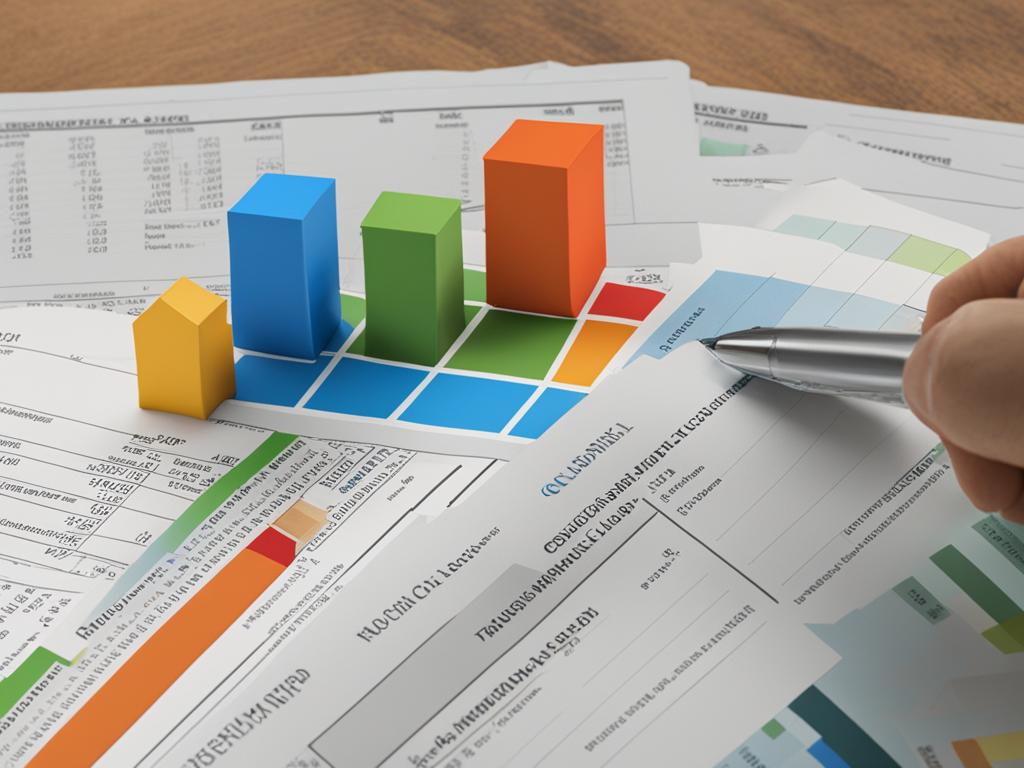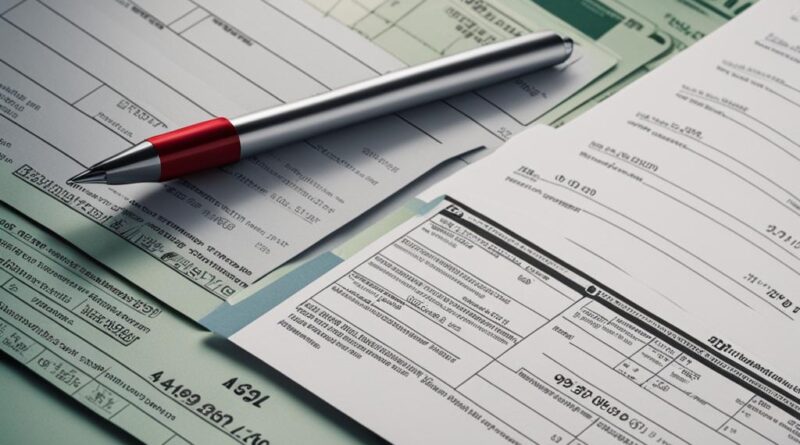Understanding Your Will County Property Tax Bill
As a homeowner in Will County, it’s important to understand how your property tax bill is calculated and what factors contribute to its amount. By familiarizing yourself with the Will County property tax assessment process and the terminology associated with property taxes, you can gain clarity on this financial obligation.
When it comes to your property tax bill in Will County, two main factors come into play: the property’s equalized assessed value and the tax rate set by local taxing districts. The equalized assessed value is determined by local township assessors and takes into account factors such as property characteristics and recent sales in the area. The tax rate, on the other hand, is determined by the budget needs of the taxing districts.
Understanding the terms related to property taxes is crucial for comprehending your tax bill. Terms such as equalization factor, equalized assessed value, exemption, levy, market value, tax code, tax rate, and taxing body all play a role in the calculation of your property tax bill.
Key Takeaways:
- Will County property tax bills are determined by the property’s equalized assessed value and the tax rate set by local taxing districts.
- The equalized assessed value is determined by local township assessors based on factors such as property characteristics and recent sales in the area.
- The tax rate is determined by the budget needs of the taxing districts.
- Familiarize yourself with property tax terms such as equalization factor, equalized assessed value, exemption, levy, market value, tax code, tax rate, and taxing body to better understand your tax bill.
Calculating Your Assessment
Calculating your property assessment in Will County is a straightforward process that involves the determination of your property’s market value and the application of any applicable equalization factors and exemptions. Understanding how your assessment is calculated is essential to gaining clarity on your property tax obligations.
Determining Market Value
The first step in calculating your assessment is determining the market value of your property. This value is typically based on recent sales of comparable properties in your area. Your local township assessor will consider factors such as property characteristics and recent sales data to arrive at an estimate of your property’s market value.
Once the market value is determined, your local township assessor divides it by three to arrive at the total assessed value for your property.
Applying Equalization Factors and Exemptions
In Will County, the supervisor of assessments may apply an equalization factor to adjust assessed values to ensure fairness and uniformity across different townships. If an equalization factor is applied, it is multiplied by the total assessed value of your property.
After the application of the equalization factor, any qualified exemptions are then subtracted from the total assessed value to arrive at the equalized assessed value.
It’s important to note that Will County offers various property tax payment options, and you can search for your Will County property tax information online, making it easy to access and understand your assessment and other relevant details.
| Assessment Calculation | Formula |
|---|---|
| Market Value | Based on recent sales of comparable properties |
| Total Assessed Value | Market Value ÷ 3 |
| Equalization Factor (if applicable) | Total Assessed Value × Equalization Factor |
| Equalized Assessed Value | Total Assessed Value – Exemptions |
Understanding how your assessment is calculated is the first step to gaining a clear understanding of your property tax bill. By familiarizing yourself with the factors involved in the assessment process, you can make informed decisions regarding your property tax obligations in Will County.
Understanding Tax Rates and Tax Codes
In Will County, tax rates and tax codes play a crucial role in determining property tax bills. It’s important to understand how these factors work to gain clarity on your tax obligations.
Tax rates in Will County are set by local government bodies responsible for levying taxes. These rates are determined based on the budget needs of various taxing districts in the area. To calculate the tax rate, the total amount of money needed by the taxing districts is divided by the total assessed value (tax base) of all properties within a particular tax code area.
Each property within a tax code area is subject to the same combination of tax rates, as they fall under the jurisdiction of the same combination of taxing districts. It’s essential to note that tax rates can fluctuate due to changes in local government spending, even if assessed values remain stable or decrease.
Will County Tax Bill Due Date
Understanding the tax bill due date in Will County is crucial to avoid any late payment penalties. The due date for property taxes in Will County is typically September 1st of each year. It’s important to mark this date on your calendar and ensure timely payment to prevent any potential issues.
Will County Treasurer’s Role in Property Taxes
The Will County Treasurer is responsible for collecting and distributing property taxes. Once you receive your tax bill, you can make payment to the county treasurer’s office. It’s advisable to check the official Will County Treasurer’s website for detailed instructions and payment options to ensure a seamless and hassle-free tax payment process.
| Tax Rates | Tax Codes |
|---|---|
| Set by local government bodies | Determined based on the budget needs of taxing districts |
| Calculated by dividing the total amount of money needed by the taxing districts by the total assessed value of properties within a tax code area | Each property within a tax code area has the same combination of tax rates as they fall under the jurisdiction of the same combination of taxing districts. |
| Tax rates can fluctuate based on changes in local government spending | Understanding tax codes and their impact on property tax bills |
Property Tax Exemptions in Will County
Will County offers various property tax exemptions that can help homeowners reduce their tax burden and lower their property tax bills. These exemptions are available to individuals who meet specific criteria and qualifications set by the county. By taking advantage of these exemptions, homeowners can potentially save a significant amount of money on their property taxes.
One of the most common exemptions available in Will County is the general homestead exemption. This exemption is available to homeowners who use their property as their primary residence. By applying for this exemption, homeowners can reduce the assessed value of their property, leading to a lower property tax bill.
“The general homestead exemption is a valuable tool for homeowners in Will County to reduce their property tax burden. By lowering the assessed value of their property, homeowners can save money on their tax bill.”
In addition to the general homestead exemption, Will County also offers exemptions for senior citizens, veterans, disabled persons, and other specific categories. These exemptions are designed to provide tax relief to individuals who may be facing financial hardships or have served in the military.
Property Tax Appeal in Will County
If you believe that the assessed value of your property is inaccurate or that you qualify for an exemption that has not been applied, you have the right to file a property tax appeal in Will County. The appeal process allows homeowners to contest their property’s assessment and seek a reduction in their property tax bill. It is essential to gather supporting documentation, such as recent sales data or evidence of property damage, to strengthen your case during the appeal process.
Filing a property tax appeal can be a complex and time-consuming process, so it may be beneficial to consult with a qualified attorney or tax professional who specializes in property tax appeals in Will County. They can guide you through the process, help you gather the necessary evidence, and present your case effectively to the appropriate authorities.
By understanding the property tax exemptions available in Will County and the process of filing a property tax appeal, homeowners can take proactive steps to reduce their property tax bills and ensure they are only paying their fair share of taxes.
Understanding Your Tax Bill Calculation
To understand your Will County tax bill, it’s crucial to grasp the calculation that determines the amount you owe. The two key factors in this calculation are the equalized assessed value (EAV) of your property and the tax rate for your tax code area. The EAV is determined by the local township assessor based on property characteristics and recent sales. The tax rate is set by local government bodies to meet the budget needs of taxing districts in your area.
To calculate your tax bill, the EAV of your property is multiplied by the tax rate for your tax code area. This equation results in the actual amount of tax dollars you are required to pay. It’s important to note that tax bills can fluctuate even if assessed values go down, as they are influenced by changes in local government spending. This means that increases or decreases in local government budgets can impact your tax rate and subsequently affect your tax bill.

Table 1 provides an example of how tax bills can change over a five-year period based on varying local government spending. It demonstrates how increases or decreases in the tax rate can affect your tax bill, regardless of changes in assessed values. This table illustrates the importance of understanding the connection between local government spending and your tax bill.
| Year | EAV | Tax Rate | Tax Bill |
|---|---|---|---|
| Year 1 | $100,000 | 1.5% | $1,500 |
| Year 2 | $100,000 | 2% | $2,000 |
| Year 3 | $100,000 | 1% | $1,000 |
| Year 4 | $100,000 | 2.5% | $2,500 |
| Year 5 | $100,000 | 1.5% | $1,500 |
Summary:
Understanding the calculation behind your Will County tax bill is crucial in comprehending how it is determined. By knowing the relationship between the EAV of your property and the tax rate, you can gain insight into the factors that influence your tax bill. Additionally, recognizing the impact of local government spending on tax rates can provide valuable context when assessing fluctuations in your tax bill over time.
Calculating Your Tax Bill

Calculating your Will County tax bill is a straightforward process. By understanding the key components involved, you can have a clear idea of how much you owe. To calculate your tax bill, you need to multiply the net equalized assessed value (EAV) of your property by the tax rate for the specific tax code area where your property is located.
The net EAV is the assessed value of your property after any qualified exemptions have been subtracted. These exemptions can include the general homestead exemption, exemptions for senior citizens, veterans, and disabled persons, among others. Once the net EAV is determined, it is multiplied by the tax rate to calculate the actual amount of tax dollars you owe.
It’s important to note that the tax rate is set by local government bodies based on their budget needs. The tax code area in which your property is located determines your specific combination of tax rates. To find accurate information about your property tax bill, you can utilize online resources to search for your Will County property tax information.
Table: Example Calculation of Will County Tax Bill
| Property | Assessed Value | Exemptions | Net EAV | Tax Rate | Tax Bill |
|---|---|---|---|---|---|
| Property A | $200,000 | $5,000 | $195,000 | 7.5% | $14,625 |
| Property B | $300,000 | $10,000 | $290,000 | 8.0% | $23,200 |
| Property C | $150,000 | $0 | $150,000 | 6.5% | $9,750 |
In the example table above, you can see how the tax bill is calculated for three different properties. Property A has an assessed value of $200,000, with $5,000 in exemptions, resulting in a net EAV of $195,000. With a tax rate of 7.5%, the tax bill for Property A is $14,625. Similarly, the tax bills for Property B and Property C are calculated based on their respective assessed values, exemptions, and tax rates.
Understanding how your tax bill is calculated and exploring property tax payment options available in Will County can help you effectively manage your property tax obligations. By utilizing online resources for property tax searches, you can access relevant information specific to your property and make informed decisions regarding your tax payments.
How Local Government Spending Affects Your Tax Bill
Local government spending plays a crucial role in determining the amount you pay for property taxes in Will County. When taxing districts increase their budgets to meet their needs, the tax rate may rise, resulting in higher taxes for property owners. Conversely, if these districts decrease their spending, your taxes may decrease, even if the assessed value of your property goes up. It’s important to understand the relationship between local government spending and your tax bill to make informed decisions and plan your finances accordingly.
One way to mitigate the impact of local government spending on your tax bill is by filing a property tax appeal in Will County. If you believe your tax bill is unjust or incorrect, you have the right to challenge the assessment. By appealing your property’s assessed value, you may be able to lower your tax bill and ensure fairness in the tax assessment process. However, it’s important to consult with a professional or familiarize yourself with the proper procedures for filing a property tax appeal to increase your chances of success.
Additionally, exploring property tax payment options in Will County can provide some relief in managing your tax bill. Will County offers various methods for making property tax payments, including online payment systems and installment plans. These options may help you budget your tax payments more effectively and alleviate any financial burden associated with a higher tax bill. It’s essential to research and understand the available payment options to determine which one best suits your needs and preferences.

Table: Impact of Local Government Spending on Tax Bills
| Scenario | Local Government Spending | Tax Rate | Tax Bill |
|---|---|---|---|
| Scenario 1 | Increased | Raised | Higher |
| Scenario 2 | Decreased | Lowered | Lower |
The table above illustrates how local government spending can affect tax bills. In Scenario 1, where government spending increases, the tax rate rises, resulting in higher tax bills. Conversely, in Scenario 2, where government spending decreases, the tax rate is lowered, leading to lower tax bills. It’s important to note that these scenarios are simplified examples and actual tax bills may vary based on individual property assessments and specific taxing districts.
Tax Relief and Exemptions for Homeowners
In Will County, homeowners have access to several tax relief options and exemptions that can help reduce their property tax burden. These exemptions are designed to provide financial assistance to eligible individuals and lower their property’s assessed value, ultimately resulting in a lower tax bill. Understanding and taking advantage of these exemptions can be beneficial for homeowners looking to alleviate their tax obligations.
Property Tax Exemptions in Will County
Will County offers a range of property tax exemptions that homeowners can apply for. These exemptions include:
- General Homestead Exemption: This exemption is available to homeowners who use their property as their primary residence. It provides a reduction in the property’s assessed value.
- Senior Citizens Exemption: This exemption is available to homeowners aged 65 or older and provides additional tax relief based on income criteria.
- Veterans Exemption: Eligible veterans can receive a reduction in their assessed value based on their military service.
- Disabled Persons Exemption: This exemption is available to homeowners with disabilities and provides additional tax relief based on income criteria.
These exemptions can significantly reduce a homeowner’s property tax bill, but it’s important to determine eligibility and apply for them in a timely manner.
Property Tax Appeal in Will County
If homeowners believe that their property’s assessed value is incorrect or that they qualify for an exemption that hasn’t been applied, they have the option to file a property tax appeal in Will County. This process allows homeowners to present evidence to challenge their assessment and request a reduction in their property’s assessed value. It’s important to consult with a tax professional or an attorney familiar with property tax appeals to understand the process and maximize the chances of a successful appeal.

In conclusion, homeowners in Will County have access to various tax relief options and exemptions that can help lower their property tax bills. Understanding these exemptions and filing a property tax appeal if necessary can provide significant financial relief. It’s important for homeowners to research and take advantage of these opportunities to minimize their property tax obligations and ensure a more manageable financial situation.
Frequently Asked Questions about Property Taxes in Will County
As a homeowner in Will County, understanding property taxes is crucial to managing your financial obligations. Here are answers to some frequently asked questions that can help clarify the complexities of property taxes in Will County.
What is an assessment?
An assessment is the process of determining the value of your property for tax purposes. The assessed value is used to calculate your property tax bill. In Will County, assessments are conducted by local township assessors based on factors such as property characteristics and recent sales in the area.
How is market value determined?
Market value is an estimate of the price your property would sell for on the open market. In Will County, assessors use valid sales data from the previous three years to calculate market value. This data is essential in determining the assessed value of your property and ultimately affects your property tax bill.
How can I challenge my assessment?
If you believe your property assessment is inaccurate or unfair, you have the right to challenge it through the property tax appeal process. In Will County, you can file an appeal with the local Board of Review. It’s important to gather evidence to support your case, such as recent comparable sales or evidence of structural issues that may affect the value of your property.
What is the impact of assessments on tax rates?
Assessments play a role in determining the tax rates in Will County. Tax rates are calculated by dividing the total amount of money needed by the taxing districts in an area by the total assessed value of all properties within a tax code area. If assessments increase, tax rates may decrease to maintain revenue neutrality, and vice versa.

These are just a few of the common questions surrounding property taxes in Will County. By understanding the assessment process, market value, appeal options, and the relationship between assessments and tax rates, homeowners can better navigate their property tax obligations. Remember to consult with local authorities or professionals for specific advice related to your property and circumstances.
Conclusion
Understanding your Will County property tax bill is crucial for homeowners in the area. By familiarizing yourself with the factors that determine your tax bill, such as assessed value and tax rates, you can make informed decisions and explore options for tax relief. Whether it’s understanding your assessment, exploring exemptions, or appealing your tax bill, being knowledgeable about the property tax process can help you navigate your obligations as a homeowner in Will County.
Property taxes in Will County play a significant role in funding local government services and infrastructure. It’s important to stay informed about changes in tax rates and how they may impact your tax bill. Additionally, taking advantage of property tax exemptions can help reduce your assessed value and ultimately lower your tax liability.
As a homeowner in Will County, it’s essential to be proactive in managing your property taxes. Stay up-to-date with important dates, such as the tax bill due date, and explore the various payment options available to you. Additionally, consider utilizing online resources to search for your specific property tax information and to stay informed about any changes or updates.
FAQ
What factors determine my property tax bill in Will County?
Your property tax bill in Will County is determined by two factors: the property’s equalized assessed value and the tax rate set by local taxing districts.
How is my property’s assessed value calculated?
Your assessed value is calculated by your local township assessor using valid sales in your area from the previous three years. The assessor divides the market value of your property by three to determine your total assessed value.
What are tax rates and tax codes?
Tax rates in Will County are set by local government bodies that levy dollars based on their budget needs. Tax codes are specific areas within Will County that have the same combination of tax rates due to being under the jurisdiction of the same combination of taxing districts.
What exemptions are available for property owners in Will County?
Will County offers various property tax exemptions, including a general homestead exemption and exemptions for senior citizens, veterans, and disabled persons. These exemptions help reduce the assessed value of a property and lower the property tax bill.
How is my tax bill calculated?
Your Will County tax bill is calculated by multiplying the equalized assessed value of your property by the tax rate for the tax code area where your property is located. This calculation gives you the actual amount of tax dollars you owe.
How does local government spending affect my tax bill?
Local government spending has a significant impact on whether your property taxes increase or decrease. If taxing districts increase their budgets, the tax rate may rise to cover their expenditures, leading to higher taxes. Conversely, if taxing districts decrease spending, your taxes may decrease, even if your property’s assessed value goes up.
What tax relief options are available for homeowners in Will County?
Will County offers various tax relief options, including exemptions for homeowners such as the general homestead exemption, exemptions for senior citizens, veterans, disabled persons, and more. These exemptions can help reduce your property’s assessed value and lower your tax bill.
How do I search for my specific property tax information in Will County?
You can utilize online resources to search for your specific property tax information in Will County. The county provides options for property tax payment and search.
How can I appeal my Will County property tax assessment?
If you believe you qualify for an exemption that has not been applied to your property, you can file a property tax appeal in Will County to contest the assessment.
Are there any specific deadlines I need to be aware of for my Will County tax bill?
It’s important to know the tax bill due date in Will County and understand the role of the Will County treasurer in handling property taxes. Make sure to stay informed about deadlines and payment options.
Where can I find information about property taxes in Will County?
You can search for your Will County property tax information online. Utilize the resources provided by the county to access information regarding your property tax bill.

